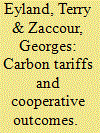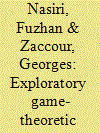| Srl | Item |
| 1 |
ID:
127302


|
|
|
|
|
| Publication |
2014.
|
| Summary/Abstract |
In the absence of an international environmental agreement (IEA) on climate change, a country may be reluctant to unilaterally implement environmental actions, as this may lead to the relocation of firms to other, lax-on-pollution countries. To avoid this problem, while still taking care of the environment, a country may impose a carbon tariff that adjusts for the differences between its own carbon tax and the other country's tax. We consider two countries with a representative firm in each one, and characterize and contrast the equilibrium strategies and outcomes in three scenarios. In the first (benchmark) scenario, in a first stage the regulators in the two countries determine the carbon taxes noncooperatively, and in a second stage, the firms compete à la Cournot. In the second scenario, the regulators cooperate in determining the carbon taxes, while the firms still play a noncooperative Cournot game. In the third scenario, we add another player, e.g., the World Trade Organization, which announced a border tax in a prior stage; the game is then played as in the first scenario. Our two major results are (i) a border-tax adjustment (BTA) mimics quite well the cooperative solution in setting the carbon taxes as in scenario two. This means that a BTA may be a way around the lack of enthusiasm for an IEA. (ii) All of our simulations show that a partial correction of the difference in taxes is sufficient to maximize total welfare. In short, the conclusion is that a BTA may be used as a credible threat to achieve an outcome that is very close to the cooperative outcome.
|
|
|
|
|
|
|
|
|
|
|
|
|
|
|
|
| 2 |
ID:
092758


|
|
|
|
|
| Publication |
2009.
|
| Summary/Abstract |
This study proposes a game-theoretic approach to model and analyze the process of utilizing biomass for power generation considering three players: distributor, facility developer, and participating farmer. We characterize the Nash equilibrium of the sequential game and discuss its features. A special attention is devoted to the analysis of the impact of incentives and initial target on the equilibrium, in which the biomass is part of electricity production.
|
|
|
|
|
|
|
|
|
|
|
|
|
|
|
|